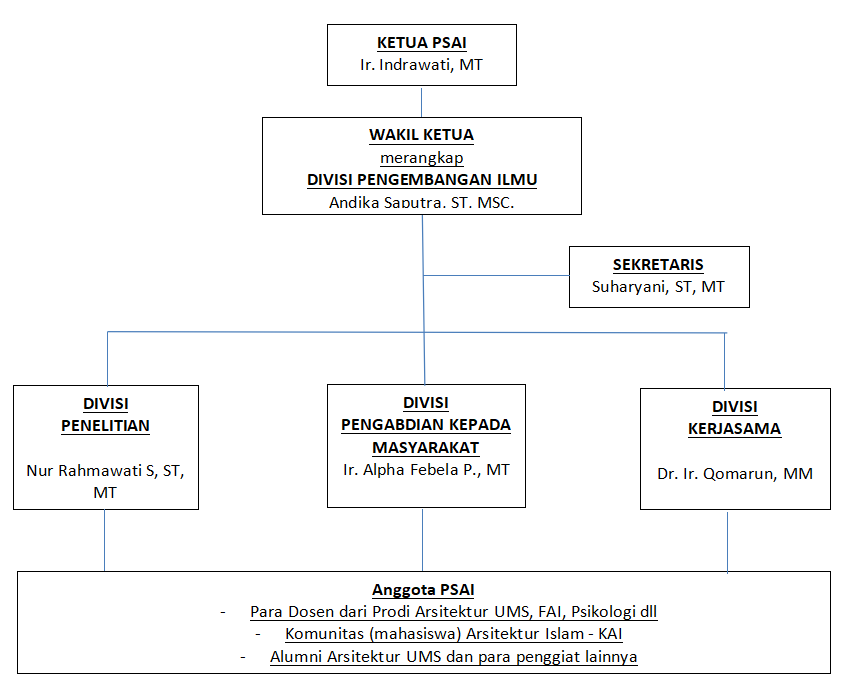Islamic Architecture Research Centre
History
There are two way of perspective to define the Islamic Architecture. First, Islamic Architecture is architecture based on value of islamic teachings (syari’ah Islam) based on Al Qur’an and Al Hadits. Second, Islamic Cultural Architecture is architecture cultural product of islamic society (moslem), both architecture as the work of Islamic society, architecture of islamic worship, architecture from a local society, regional and islamic country or architecture from Arabic peninsula as the places where the Islam came from. The extent of spatial content and culture from the boundaries of islamic architecture, make the shape of islamic architecture is very diverse. This variation caused by islamic teachings (Al Qur’an and Al Hadits) interpreted differently by the society, it influenced by other ideologies that are local in nature.
Diversity form above makes the object of islamic architecture gets much larger and getting more attention from researchers. Some university from America and Europe such as Havard and Oxford University has developed this field of study. The held of Aga Khan Award from 1977 became one proof of the attention of the academic world and practitioners to the entity of Architecture Islam (http://www.akdn.org/akaa_award10.asp). In some of University from Indonesia (Institut Teknologi Bandung, Universitas Indonesia dan sebagainya), had included ‘arsitektur Islam’ courses in their curriculum.
In order to selecting their featured programs, PS-Architecture referring to Vision of UMS and Faculty of Engineer, and other external environment. As the part of Private Islamic College and Muhammadiyah charity venture who has a vision as the center of Islamic edication and developmend of science and technology based on islam and give direction of change. The Faculty of Engineering UMS has a vision as the center of featured engineering field that could produce qualified and competitive graduates on the scale of local, national, nor international that has character and have an islamic spirit. Starting from the two of great vision that included, development of islamic architecture study on global context and religious characteristic of major Indonesian that dominated by moslem, expressly stipulated that PS- Architecture as The Center of Featured Islamic Architecture.
In 2004 PS- Architecture UMS set up the Islamic Architecture Research Center (PSAI) to support the effort to achieve the goal above. PSAI confirmed based on SK Dekan Fakultas Teknik UMS No.033/IV/FT/2004 on September 27, 2004, that has renewed by SK Rektor UMS No. 056/IV/2005 on June, 30 2005. On 2018 carried out updating the manager PSAI based on SK Rektor UMS No 32/IV/2018 on March 19, 2018 tentang Pergantian Pengelola Pusat Studi Arsitektur Islam Universitas Muhammadiyah periode 2018-2021.
Philosophical View
‘Islamic Architecture Research Center (PSAI) is an organization focused on science development activities, research and community service to make the madani built environment.’
Philosophical View of PSAI based on the following assumption:
- The goal of Islamic Architecture not for Architecture itself. Islamic Architecture Arsitektur Islam as a container for human life with the artifact-technological dimension is a means to realize the quality of a civilized human being.
- Civilized humans are servants as well as representatives of Allah who are able to recognize and acknowledge the position of all things according to their correct place based on the degree and dignity that Allah has established.
- Efforts to create civilized human qualities are only possible in the built environment of Madani.
- The built environment of Madani is a living space where Islam as Dien is applied comprehensively in all aspects of human life.
- The built environment of Madani includes a mosque room, education room and residential space which is called the Madani space trilogy.
- The ideals of the built environment of Madani have been manifested in the history of Islamic civilization referring to the Medina space in the lifetime of the Prophet Muhammad, peace be upon him, and his companions who were asked by Allah as the first generation as well as the best generation of Muslims who became role models for the generations after that until the Day of Judgment.
Organization Structure
2018-2021
Based on SK Rektor UMS No 32/IV/2018 on March 19, 2018 tentang Pergantian Pengelola Pusat Studi Arsitektur Islam Universitas Muhammadiyah periode 2018-2021, organization structure of PSAI based on following:

Vision, Mission, Goal and Programs of Work
Vision
PUSAT PENGEMBANGAN ILMU, PENELITIAN, DISEMINASI DAN PENGAMALAN ARSITEKTUR ISLAM
Mission
- Development of Islamic architecture knowledge through research activities in the realm of philosophical territory (philosophical – basic research), applied (applied-research) to development research (research and development) with a focus on the Madani neighborhood trilogy covering Mosque Architecture, Madrasa Architecture and Residential Architecture.
- Disseminating research results through dissemination and publication on a local, national and international scale.
- The practice of knowledge through community service is based on the results of research on Islamic architecture as a form of da’wah.
- Research, service and publication activities are carried out cyclically to form a cluster of Islamic architectural knowledge
Goal
- The creation of a solid Islamic Architecture Research Center (PSAI) to support the optimal development of Islamic architecture
- The development of Islamic architecture as a scientific field, research methods and design featured by the PS-Architecture UMS
- Become a reference center for mosque architecture design, madrasa architecture and residential architecture
- The increasing reach, continuity and progressiveness of the publication and application of Islamic architecture
- Gradual development of the civil society
Program of Work
- Long Term Work Program (2018-2029)
Target: Optimizing the Role of PSAI in Strengthening Islamic Architecture as a Field of Science and Community Service - Medium Term Work Program (2018-2021)
Target: Synchronization of PSAI’s Performance as Superior Support PS- Architecture UMS - Annual Work Program (2018-2019)
Target: Internal Strengthening of PSAI
The PSAI Strategic Plan can be downloaded here.